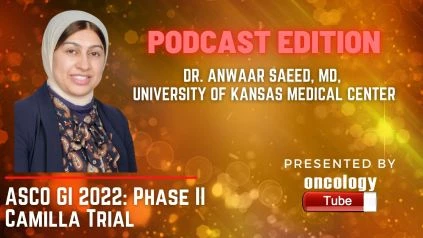Dr. Anwaar Saeed, MD, Associate Professor of Medicine, Division of Medical Oncology, Associate Director- Early Phase Program at University of Kansas Medical Center. In this video, she speaks about the ASCO GI 2022 Abstract – Phase II trial of cabozantinib (Cabo) plus durvalumab (Durva) in chemotherapy refractory patients with advanced mismatch repair proficient/microsatellite stable (pMMR/MSS) colorectal cancer (CRC): CAMILLA CRC cohort results.
Origins:
Â
Cabo is a multi-kinase inhibitory anti-VEGFR2/MET/AXL medication with a broad anti-VEGFR2/MET/AXL range. Cabo showed good immune modulatory action in preclinical and clinical tests in several solid malignancies, with clinical synergy evident when paired with PD-1/PD-L1 inhibitors like Durva. After the phase Ib GI basket CAMILLA experiment, which evaluated Cabo + Durva in 30 patients (pts) and found it to be safe and effective, the trial was expanded to a phase 2 multi-cohort, multi-center trial with 117 pts. The results of the phase 2 CRC cohort, the first study of cabo + IO in this population, are presented here.
Â
Methodologies:
Â
Cabo + Durva was given to patients in this group at an RP2D of 40mg QD and 1500mg IV Q4W, respectively. Patients who are enrolled must have gone through two or more lines of therapy. The overall response rate (ORR) was the primary end measure, with the rate of treatment-related adverse events (TRAE), investigator-assessed disease control rate (DCR), progression-free survival (PFS), and overall survival as secondary outcomes (OS). In patients with RAS wild type tumors, subgroup analysis was performed. In patients who had a verified partial response (PRc)/ stable disease (SD) for more than 6 months, an exploratory investigation of pathogenic molecular tumor changes was performed using next generation sequencing (NGS).
Â
Findings:
Â
Of the 36 participants, 29 (16F, 13M) were able to be evaluated for efficacy. The average age is 57 years old (27-76). 90% (26%) had an ECOG of 1. All of the tumors had pMMR/MSS, 41% (12) had RAS wild type tumors, and 6.9% (2) had HER2 amplification. 52 percent (15) had undergone at least three lines of treatment. All had metastases in three places, with 79 percent (23) of them in the liver. Treatment-related serious adverse events (SAEs) occurred in 31 percent (11/36) of the 36 patients evaluated for safety. Grade 1-2 tiredness (53%) was the most prevalent TRAE, followed by nausea (42%), diarrhea (36%), anorexia (31%), hand-foot syndrome (22%), and hypertension (22%). (16 percent ). Immune-related adverse events (IRAE) of grade 3 occurred in 16.6% (6/36). The ORR was 27.6% (8/29); PRc was 21% (6/29); DCR was 86.2 percent (25/29); median DOR was not reached (NR); median PFS was 4.4 months; 6-month PFS was 28%; and median OS was 9.1 months. ORR (PRc) was 50.0 percent, DCR was 83.3 percent, median PFS was 6.3 months, and median OS was NR in the RAS wild type subgroup. One of the seven patients with a PRc/SD > 6 months exhibited a KRAS G12V tumor mutation as well as mutations in ARID1A and IDH1. The remaining patients had RAS wild type tumors, and the following NGS changes were found among them: There was one HER-2 amplification, one MET amplification, and two ATM changes.
Â
Outcomes:
Â
Cabo + Durva showed promise efficacy and was well tolerated in severely treated pMMR/MSS CRC patients, with no new safety flags. These promising results encourage continued testing of this regimen as salvage therapy in pMMR/MSS CRC in a randomized setting. NCT03539822 is the number for the clinical trial.

